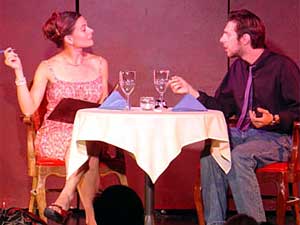|
Audio
Photos
Resources
|
Minneapolis, Minn. — To the artists and others at Wednesday night's public meeting, Minneapolis' new strategic arts and culture plan looked great. And it should have -- it's the result of three years of effort on the part of the Minneapolis Arts Commission, and involved the input of more than 500 people representing various neighborhoods and arts organizations.
Minneapolis Mayor R.T. Rybak says the plan will ensure the future well-being of what is already a culturally dynamic city.
"When I really see the art percolating in this city, in the middle of the Fringe Festival, when the art festivals are going on and we see somebody doing a spontaneous art performance on the Stone Arch bridge, I feel so proud to be mayor of a city that has so much art percolating from just the basic DNA of the city of Minneapolis. I want to make sure we do everything we can to keep nurturing that," says Rybak.
Mayor Rybak says under the guidance of the new plan, the city will develop cultural leaders, double funding for public art, and promote Minneapolis arts and culture both locally and nationally. He says a key aspect of the plan is to support those small and mid-sized arts organizations that don't have a large staff or wealthy boards.
But this is the same mayor who drastically cut back his Office of Cultural Affairs four years ago in an effort to dig the city out of some major debt. And artists have not forgotten that. Wendy Knox, director of the Frank Theater, says a plan is a plan and nothing more.
"I'm skeptical. We've seen how many arts plans have gone through," says Knox. "I want to believe the city of Minneapolis will demonstrate a commitment to the arts by acting on what has been put out. But right now, listening to what has been said, it feels like these are some really glib, easy answers."
The City Council approved the arts and culture plan earlier this month, so in a sense the council has agreed to meet its goals. However there was no money attached to that approval.
The true test will be in the months and years to come, as individual arts proposals are brought before the council for funding. But last year Mayor Rybak also attempted to double funding for public art, and the city council voted it down. So what's changed?
Minneapolis Arts Commission chair Jane Gregerson says the commission has matured, and several new elements are in place.
"The quality of the plan, number one," says Gregerson, "and the involvement of the city staff across several departments. And the leadership of the commission. I mean, we are organized!"
The Minneapolis Arts Commission is made up of volunteers. Walker Art Center director Kathy Halbreich says she's worried the new arts and culture plan won't go anywhere without someone dedicated full time to lobbying for it. She says Minneapolis needs a cohesive and concrete plan of action.
"There isn't even a Web site that lists all the activities in this city on any one night," says Holbreich. "So I think this is a fantastically ambitious beginning. I think it's a reflection of the heart soul and minds of many, many people. I just want some more bone and flesh on it."
Halbreich says one of the most crucial components of the plan is the city's commitment to preserving and strengthening arts education for youth. But she also knows that when the education budget is tight, arts education is often the first thing to go.
City Councilmember Gary Schiff is optimistic, but he admits the city's arts funding picture won't change overnight.
"These issues come up all the time. It's sprinkled throughout our business, day in and day out. It's not going to culminate in one giant vote of, either the arts happen or they don't. It's going to fall under zoning and planning, and the planning committee which the Minneapolis arts commission already reports to," Schiff says.
"The arts commission has a voice, and they're going to hold us accountable," says Schiff. "And the voters will hold us accountable. And we're going to move forward with the plan and we're going to get it done."
If, as Schiff suggests, the voting public will be watching what elected officials do for the arts, they were not paying close attention at the commission's public meeting.
There are approximately 400,000 people in Minneapolis, and about 60 showed up to discuss the city's 10-year plan for the arts.







